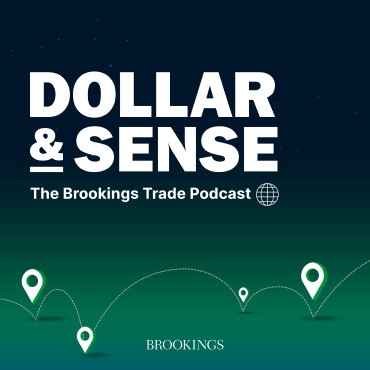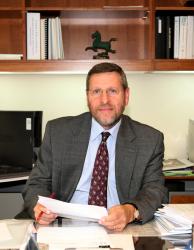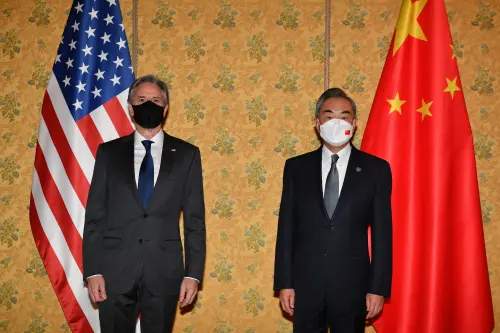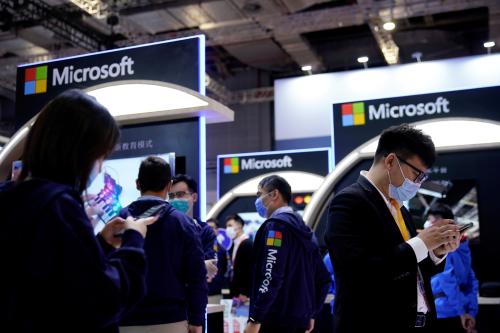China’s legislature, the National People’s Congress, recently voted to prepare national security legislation that will impose new restrictions on Hong Kong and may threaten the civil and political rights of the people there. To explain what led to this recent escalation and the implications for Hong Kong’s “special status” under U.S. law, David Dollar is joined by Richard Bush, a nonresident senior fellow in the Center for East Asia Policy Studies at Brookings.
Hong Kong in the Shadow of China
From persuasion to coercion: Beijing’s approach to Taiwan and Taiwan’s response
A requiem for the city of Hong Kong
Is China undermining the global economic order or helping build it?
This transcript has been lightly edited for clarity.
DOLLAR: Hi, I’m David Dollar, host of the Brookings trade podcast. Dollars & Sense. Today, we’re going to talk about Hong Kong. China’s National People’s Congress voted to impose a national security law on Hong Kong and we’re very fortunate to have one of the world’s leading experts on Hong Kong, Hong Kong-mainland relations, and Hong Kong-U.S. relations. That is Richard Bush, and he’s a nonresident senior fellow in the Center for East Asia Policy Studies at Brookings. So welcome to the show, Richard.
BUSH: Thank you very much, David, for having me. It’s a great pleasure.
DOLLAR: So China’s National People’s Congress voted to prepare a national security law for Hong Kong, but they haven’t drafted that law yet. So do we have a sense of what will be in it, why it’s important, and is there any flexibility still, do you think, in what it includes?
BUSH: At this point there is a high degree of uncertainty about what’s going to be in the bill and what it means for the rule of law in Hong Kong and the civil and political rights that Hong Kong people were granted at the time that Britain transferred Hong Kong back to China. In the so-called “Basic Law” for Hong Kong, the mini constitution that China wrote for the territory, it did set a requirement that the Hong Kong government pass and enact a national security law. I’ll go into the details of what that was to include.
The reason was a practical one. Hong Kong already had laws governing sedition and treason and that sort of thing on the books, but they were written during the British colonial period, and they were actually used in the 1950s and 1960s to crack down on local communists. So the last thing that a nationalistic People’s Republic of China government would want would be to have one of its territories enforcing British laws, essentially. So this was, in effect, unfinished business that they thought that the Hong Kong government would be able to carry out.
As far as the details, the law was required to prohibit any act of treason, secession, sedition, subversion, against the Central People’s government. Theft of state secrets. It also was to prohibit foreign political organizations or bodies from conducting political activities in Hong Kong. So you get the idea. It’s to create the authorities necessary to protect against attacks against the state.
What happened was that when the Hong Kong government decided to try and carry out this obligation, meet this obligation, it was met with large protest — not as large as the protests we’ve seen in recent years, but half a million people came out on July 1st, 2003. That’s about seven percent of the Hong Kong population. And the government ended up pulling the bill. The Hong Kong government has never had the courage since then to try and do it again. So this is the point at which the PRC government is saying we’ve got to take care of this unfinished business.
DOLLAR: But why now? I mean, that history is very interesting. So back in 2003 people were demonstrating against this. Issues festered for a long time. Why are the communist leaders pursuing this now?
BUSH: It’s a range of converging reasons. From their point of view, maybe it makes sense. First of all, the 2003 demonstrations led over time to political activities that were conducted less and less within the rules that the government had set forward. The 2000 demonstrations were pretty orderly and peaceful. What we’ve seen in the last 15 years is that they’ve become less orderly and less peaceful.
The culmination of this was the so-called “Umbrella Movement” in 2014. You’ll recall that groups of young people and others basically took over three major thoroughfares in Hong Kong. Those were blocked off, and Hong Kong was thrown into a certain amount of chaos, at least temporarily. There was some violence, at least at the beginning. This episode lasted for about two months and I think it was a signal to the leaders in Beijing that Hong Kong is changing in a way that is not good for us. Then you had the protests last year over the proposed extradition law. Those were quite violent — much more violent than the 2014 episode.
Another motivation, at least on the part of some PRC officials, is that the United States is the hidden hand that is instigating all this activity. It’s totally untrue, but any effort to convince those officials otherwise hasn’t really worked.
Finally, in September this year, there are going to be elections for the Legislative Council. When China took over Hong Kong, it had rigged the system for legislative elections so that there would always be a majority in favor of the Hong Kong government and on the side of the PRC government. The anti-China and anti-establishment opinion has become so strong that despite the rigging the anti-establishment forces might actually win control of the legislature, and this would be a bad thing. So this, in effect, is a preemptive action to try and change the rules of the political game to make it less easy for the opposition to win those elections.
DOLLAR: One of the key issues in play right now is that Hong Kong has special status under U.S. law. We recognize that it’s part of the People’s Republic of China but we treat it differently. They have this so-called “one country, two systems,” and we respect that with special status for Hong Kong. I know you were involved in the legislation that set that up in 1992 I believe was the original legislation. So can you explain, what is the special status and why is it important to Hong Kong?
BUSH: I think there’s actually some misunderstanding about this. In the public mind, this is seen as sort of a package of measures or privileges that comes as a package. We either grant it or we don’t. As the law was written, however, it is not that simple. The special treatment, or the preferential treatment, that the U.S. grants Hong Kong relative to the way it treats China is very specific to each law. The standard by which we judge whether Hong Kong merits that preferential treatment is a phrase called sufficient autonomy.
So one issue is the movement of technology to Hong Kong. There’s an understandable danger that that technology might leak into China. So the question is, is the Hong Kong customs authority strong enough and autonomous enough to prevent leakage? If it is, we can continue to provide preferential treatment. But that’s done within the context of the Export Administration Act which governs technology transfer. If this is going to be done in a way that fits the original purpose of the law, the U.S. government would have to go law by law and see whether Hong Kong is sufficiently autonomous in that particular area. If it is, we’ll continue. If it’s not, then the president is authorized to suspend it. He’s not required to, he’s just authorized, and that may be what’s going to happen now. Secretary Pompeo is has said obviously they’re not autonomous enough, but he really didn’t speak on a law by law basis.
DOLLAR: Right. So I think that’s very important. So our secretary of state has said he can no longer certify that Hong Kong is sufficiently autonomous, and I think that has created certain confusion about all of the special privileges. We’re the international trade podcast, so this is important for us because these tariffs we’ve imposed on mainland China, we don’t impose them on Hong Kong. It’s easier for Hong Kong people to get visas. Finance flows in and out very easily. So we treat Hong Kong differently from the mainland. So, as I understand from you, we’re not required now to just take all of that away.
BUSH: No. And the president has the authority to take away this part but not that part. Tariffs is a special case, actually, because based on my understanding — and you can correct me — the tariffs that we impose on Hong Kong goods are not done pursuant to U.S. law, they’re done pursuant to an international agreement: the WTO. What the U.S. Hong Kong Policy Act says about that is that we have to examine whether the Hong Kong government is legally competent to carry out its obligations under that multilateral agreement. If we decide it’s not, the only thing that happens is that the president reports to Congress. Because it’s an international agreement we have less leeway and flexibility to punish Hong Kong for that. The fact is the amount of trade that is truly Hong Kong products is not that great anymore because it’s not a manufacturing center. Most of the stuff that physically comes from Hong Kong is actually Chinese goods that are bonded in Hong Kong and therefore not subject to U.S. tariffs. So the fear about tariffs has been, I think, totally unnecessary.
DOLLAR: Thank you, Richard, you’ve just clarified two very important points. You’ve reminded me that Hong Kong is an independent member of the World Trade Organization.
BUSH: Yes, it is.
DOLLAR: As is Taiwan. Then, probably a lot of people do not understand that things transit through Hong Kong. As you say, if it comes from the mainland and transits it’s subject to these tariffs we imposed on the mainland. On the other hand, if it originates in Hong Kong, we largely have a duty-free system. But there’s not a lot of manufacturing; there’s certainly no agriculture.
BUSH: This is this would not be a big punishment, but it’s gotten people all frightened.
DOLLAR: Right, but that raises interesting questions. If the president can in some sense pick and choose among these in some sense favors were granting to Hong Kong, would you speculate on what he might take away and what he might leave?
BUSH: So one area, one that I’ve mentioned before, is advanced technology that is destined to Hong Kong. We, I suppose, could tighten up on what we demand of the Hong Kong customs authority in making sure that this doesn’t get through to China, and we are in an environment where the U.S. government generally is trying to restrict the flow of advanced technology to China across the board. The Hong Kong customs authority might be able to adjust to that, but it could create, at least for a while, a kind of climate of fear and a sense that in Hong Kong that the U.S. was trying to punish it.
Second is in the area of law enforcement cooperation, and this is one that concerns me. We have robust law enforcement cooperation with Hong Kong. It has to do with extradition, money laundering, narcotics control, and so on. But what do we do if we learned through various kinds of information that the PRC Ministry of Public Security, the Ministry of State Security, other Chinese law enforcement agencies were deeply embedded in Hong Kong law enforcement institutions? It’s difficult to argue that Hong Kong, in that respect, remains sufficiently autonomous to justify continued sort of special cooperation. I mentioned the extradition agreement we have with Hong Kong. If we were to decide that because of this national security law and other things going on that people charged in Hong Kong would not get due process of law, then we could suspend the extradition agreement.
So there are areas that will probably be looked at. I don’t know how far it will go. There’s obviously pressure in Congress and other places to do something, and Secretary Pompeo’s certification was perhaps meant to answer that. But on the other hand, one reason to look carefully in each of these areas would be to clarify what we have to lose by suspending cooperation.
DOLLAR: Right. That’s very clear. So I appreciate that, Richard. It’s probably going to take a while to really see how this plays out. If I could just add a word, I get a lot of questions about the fact that Hong Kong has its own currency and that its eventually pegged to the U.S. dollar through what’s called the currency board system. So let me just mention that there’s no reason why that should change, and that’s really a decision of the Chinese authorities. Frankly, it would be pretty crazy at this moment to change that financial system. So I expect Hong Kong to continue to have the Hong Kong dollar and for that to be tied to the U.S. dollar through the currency board system. And that’s not a decision the United States makes. If another country wants to have a currency board system then that’s a legitimate choice given Hong Kong’s role as a financial center.
BUSH: I think that’s right. I think that obviously going back this was a Hong Kong decision confirmed by the authorities in Beijing. It’s an amazing thing. You have a jurisdiction of China that pegs its currency to the U.S. dollar when it could be pegging its currency to the renminbi, but it still goes on. I think that the most precious thing at this point is Hong Kong people’s confidence about the future. We, or the Hong Kong government, or even China shouldn’t do anything to break that gossamer thread of confidence. But that would be a big one.
DOLLAR: Now, Richard, I know you’re a leading expert on Taiwan, so I have to divert the conversation briefly and ask what’s the implication of these actions vis-a-vis Hong Kong for Taiwan and its relation with the Communist Party of China?
BUSH: Well, I think for the average person on Taiwan, the thing that comes to his mind, or the thing that he or she would say, is “we told you so. You can’t trust these people.” The one country, two systems which was actually implemented in Hong Kong was originally designed for Taiwan, and it remains the Chinese proposal for Taiwan even though Taiwan has changed tremendously in the almost 40 years that it was first proffered. Hong Kong was supposed to provide positive demonstration effect of the value of one country, two systems for Taiwan. Now, on a regular basis, what goes on in Hong Kong is creating even greater negative demonstration effect. That this is just really a bad idea.
DOLLAR: So let’s end on a positive forward-looking note, Richard. What would you recommend for U.S. policy toward Hong Kong? How could we fine-tune our policies so we’re helping the people of Hong Kong and serving our own interests?
BUSH: OK. This is a tough one because the situation there is not really anything over which we have a lot of control. We certainly have interests, we have concerns and values at stake, but there are other forces at play. The first principle I would follow is that we should avoid hurting the Hong Kong people in the process of responding to this terrible development. For example, Hong Kong’s overall prosperity depends on its status as an international financial center. And a lot of people in Hong Kong are employed by financial services organizations; other parts of the economy are connected to it. Now, it is possible that the Trump administration might consider imposing financial sanctions on Hong Kong banks for some various reasons. I suspect that that would severely undermine the Hong Kong economy and hurt the very people that we supposedly are trying to help. Second, I think we should try as much as possible not to confirm China’s paranoid fear that the United States is behind this unrest. That’s hard to do, but that suggests that we shouldn’t appear to support groups in Hong Kong whose activities are inconsistent with our values.
I realize I’ve set forth two things we shouldn’t do. Perhaps the thing that we should consider going forward, in addition to doing no harm, is to consider steps that would make it easier for Hong Kong people who are finding their situation in Hong Kong just too dangerous to emigrate to the United States. These are very talented people. They do not deserve the situation they are in. They have reason to fear that maybe if they participated in a demonstration that they might be caught up in this repressive web. We would benefit by having them in our society and they would benefit by being here. I know that this is an anti-immigration administration, but this is one place that we really should make an exception.
DOLLAR: I’m David Dollar, this is Dollars and Sense podcast, and I’ve been talking to Richard Bush about the complicated situation in Hong Kong. I really appreciate those thoughtful recommendations at the end there, Richard. It’s very hard to figure out how to do no harm in a sense. Help the people of Hong Kong, but still have some kind of response to this power grab on the part of the Chinese Communist Party. So thank you very much for joining us.
BUSH: It was a great pleasure. Thanks a lot.
DOLLAR: Thank you all for listening. We’ll be releasing new episodes of Dollar & Sense every other week, so if you haven’t already, make sure to subscribe on Apple Podcasts or wherever else you get your podcasts and stay tuned. Dollar & Sense is a part of the Brookings Podcast Network. It wouldn’t be possible without the support of Shawn Dhar, Anna Newby, Fred Dews, Chris McKenna, Gaston Reboredo, Camilo Ramirez, Emily Horne, and many more.
If you like the show, please make sure to rate it and leave us a review. Send any questions or episode suggestions to [email protected]. And, until next time, I’m David Dollar and this has been Dollar & Sense.
The Brookings Institution is committed to quality, independence, and impact.
We are supported by a diverse array of funders. In line with our values and policies, each Brookings publication represents the sole views of its author(s).







Commentary
PodcastWhat’s at stake in China’s new national security legislation for Hong Kong?
June 1, 2020
Listen on
Dollar and Sense Podcast